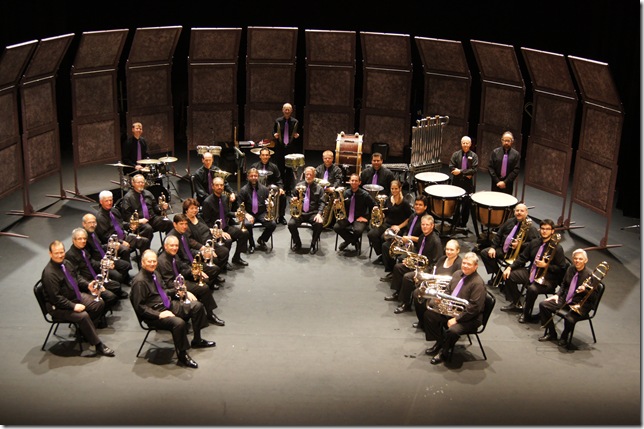The concert by Palm Beach County’s new Orchid City Brass Band at the Duncan Theatre on Saturday had the title Brassy Britannia: an offhand compliment to this very British institution ― all brass instruments, no woodwinds. Military bands and concert bands mix brass and winds, delicate reed-driven things needing far too much attention for the likes of working-class lads and lassies.
Started in the 1850s by miners, millworkers and engineering factories, brass bands reflected the pride of their contribution to the Empire on which the sun never set. They were also an advertisement for their brand. I grew up listening to the brass bands of the North of England: Foden’s Motor Works, Black Dyke Mills and Faery Aviation, all three having won the National Brass Band Championship at one time or another.
I would venture to say that with refinement, Orchid City’s 25 players will rank alongside the bands mentioned in time. The three percussionists were also first-rate.
The program opened with Russell Alexander’s fast-paced Belford’s Carnival March, familiar to circus-goers. Next came Pantomime, by Philip Sparke, with a euphonium solo from Carlyle Weber. It’s a difficult piece with lots of scales, runs and trills that were at times too tricky for Weber to master. But it was a brave attempt and won warm applause with fine accompaniment from the band.
A sweet arrangement of Lennon and Mc Cartney’s Penny Lane followed with a very fine solo from E-flat cornetist Ben Skinner. Those of you who have the Sgt. Pepper album may recall the high trumpet-like solo above the melody: well, it’s a cornet, which Sir Paul especially hired for the recording.
Elgar’s Nimrod movement from his Enigma Variations had all the brilliance, light and shade that only a brass band can command, and was on a par with anything I’ve heard before. Ralph Vaughan Williams’ Henry V overture, written for brass band, ended the first half. The Orchid City band gave a fine rendition of its three movements: Agincourt, French Battle Song and the bright-sounding Earl of Oxford’s March. Stirring music, well-played.
The audience of about 450 was most appreciative, giving them a standing ovation.
Then it was intermission, and it’s time to relate a story brass band lovers like to tell. When Sir John Barbirolli, in 1944, began rebuilding Manchester’s war-ravaged Hallé Symphony Orchestra, he heard the Salvation Army band on his way home one night. (General Booth, its founder, believed he’d bring souls to services with his brass bands). The trombone player was Masie Ringham, and she caught his acute ear. Joining his famous orchestra as principal chair at 18, Masie served him well for many years. The lady, now retired, is still teaching trombone somewhere in England, or so I’ve heard.
Part two of the program began with Edward Gregson’s Prelude for an Occasion. Full of fanfares and fugues, this special piece showed the band to perfection, capturing the smooth brass band sound beautifully. Then came Gustav Holst’s Moorside Suite, written for the 1928 British Brass Band Competition held in London’s vast Royal Albert Hall.
The adjudicators are enclosed in a shielded space, not knowing which band is playing, to ensure unbiased judging. However, a lead cornet player of the 1940’s and 50’s, Harry Mortimer, was so far above the rest as soloist that bands vied to win him over. He finally switched and it made headline news in a scandal akin to Elizabeth Taylor’s many husbands. The point being that most judges knew Mortimer’s embouchure (so much for fairness).
This Holst piece has many exposed solo parts and none came anywhere near Harry Mortimer’s prowess, which is not to belittle the overall performance, considering this is only the second public concert given by Orchid City since they were formed. The attack of each soloist was poor, and they seemed to be reaching for their notes. With time, they will improve.
The next was Kenneth Alford’s Colonel Bogey March, which won hearts and minds, and the Wallace and Gromit television series music, arranged by Michael O’Connor, the band’s president, was a real treat. A snappy jazz number by Barrie Gott called Light Walk ended the evening and sounded wonderful.
A roar of approval met this most American of idioms and served as the band’s encore. With practice and desire it won’t be long before this fine group is being invited to play in music festivals all over the state. Next year’s Festival of the Arts Boca is the one to shoot for locally.
